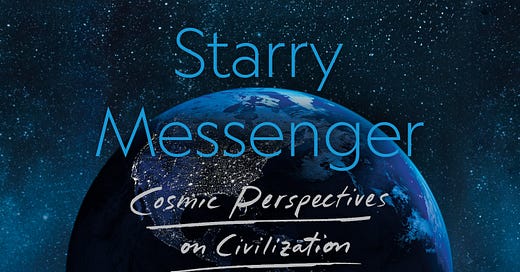“Starry Messenger” by Neil deGrasse Tyson
A book about the stars and how they affect things on Earth- but not in that way!
A scientific perspective ought to dominate my country. The Constitution gives immense weightage to the phrase “scientific temperament” and most aunties and uncles seem aghast when a budding 10th grader would opt for anything apart from “Science”. Engineering Colleges and Medical schools are more rampant than bookstores and yet India routinely falls prey to the most unscientific and irrational of acts.
Coincidence? Statistically yes, however improbable it may seem.
Thus, this book does what the science and mathematics curriculum often failed at doing for me- spark a proper interest in science powered by the “cosmic perspective”.
The Cosmic Perspective
Neil deGrasse Tyson loves waxing about the “cosmic perspective”- making it a catchphrase in his podcast StarTalk as well as building his books Astrophysics for People in a Hurry and Letters from an Astrophysicist around it.
Essentially the cosmic perspective is an awareness of one’s smallness in the face of the universe, an adjustment of one’s laughable arrogance when compared to the sheer majesty of the stars above us. Be it through the “Pale Blue Dot” or the latest images from the James Webb Telescope (find my favourite one below), the cosmic perspective succeeds in both plunging one into despair as well as opening up the mind to the infinite possibilities of the world- all based on how you choose to view the bigger picture.
“Rationalia”- Problematic only if Meritocratic
In the book, Tyson keeps stressing the need for more scientifically proven facts and measures to be put in place in one’s day-to-day lives. Powered by the scientific method, inspired by thought experiments, and running on rationality, human beings are expected to adhere to sheer reason and facts and not to the follies of their hunter-gatherer brains.
Take for instance the criminal justice system (which is incidentally the subject of a certificate course I am co-offering, more on that in a future newsletter), which in the US is powered by the jury system and hinges strongly on the weight of the witness testimony: the highest form of evidence, the lowest form of trustable scientific evidence due to how biased human memory tends to be (or not to be?).
In fact, Tyson zeroes down on the very necessity of science and tools of objective measurement owing to these biases and imperfections of the human mind. The excellent movie Rashomon is proof of the perils of subjective memory and yet time and time again the highest echelons of justice rely both on subjective recollection and subjective interpretation.
However, the solution of Rationalia which Tyson and a few of his contemporaries provide does suffer from the possibility of being tinged with meritocratic hubris. Regardless, no one can deny that the world will be a far better place if only science was taken as seriously as a few stray superstitions. Oh well, touch wood!
Do read this book, a normal eye-based perspective will suffice instead of a cosmic one. This newsletter is rather blandly delivered to you by an email-based messenger and not a starry one but the day may not be too far.
Follow this newsletter for more thoughts on vital pieces of work (and some not-so-vital ones). I will leave you with this poem I wrote when the James Webb telescope was first functioning and beaming successfully-
A Glance
Do the eyes
that peer
into the past,
wield
the poet’s curse,
or the baron’s purse?
I taste
stars
with every glance,
I shiver in awe
for what
I saw
and split.
For some,
the truth
they will realise;
for others,
yet another
Webb of lies.
-NKD




